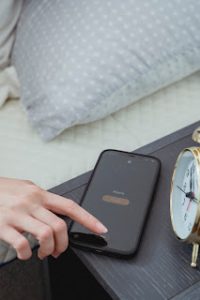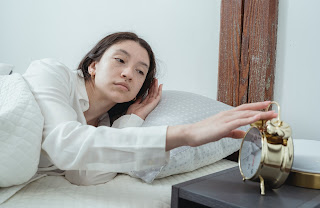Do you usually ignore your alarm clock and stay in bed for another five minutes? According to recent research, this habit is not very good for our health.
Do you need more than two alarm clocks to get out of bed in the morning? It is quite common to want to sleep “five more minutes” and to ignore the alarm clock. Although it appears to be a harmless habit, experts warn that it is not. So the question is, what effect does snoozing in the morning have on us?
Even if you believe that those five extra minutes of sleep will help you rest, the reality is quite different. Having multiple wake-up alarms can cause serious physical and mental health issues. As a result, the best option is to educate ourselves about it and develop better sleep habits in order to rest properly.
Sleep deprivation and its health consequences
Today’s society is defined by speed, innovation, and constant change, all of which have two faces. On the one hand, technological progress allows us to enjoy conveniences that make life easier. It is, however, associated with more intense and frequent demands.
People study, work, raise families, make friends, and so on. We sometimes get the impression that there aren’t enough hours in the day to get everything done. As a result, people have poor sleeping habits.

According to one study, sleep disorders are a source of discomfort for people all over the world (Chattu et al., 2018). Sleep deprivation has been linked to cardiovascular disease, anxiety, stress, depression, and other health problems.
In this regard, many people have the habit of delaying their alarm clocks in order to get a little more sleep. The reason this habit is so widespread is that few people understand the effects of snoozing in the morning. You even think it’s a good thing because the dream is “lengthening.”
The consequences of snoozing the alarm clock
It’s common knowledge that getting at least eight hours of sleep each night is necessary for restful sleep. Because of this, we could believe that sleeping in is a viable alternative. However, it’s crucial to recognize that sleep follows a pattern.
The body begins a series of processes that rejuvenate the entire organism when we go to sleep. A sleep cycle must be uninterrupted for the whole eight hours in order to be restorative. Thus, fragmenting sleep, as occurs when we slumber, alters the regular cycle of sleep.
The repeated disruptions of sleep eventually change how the brain and the rest of the body function. So even though you “slept a little more,” it is simple for you to feel more exhausted when you wake up. This has detrimental long-term health effects.
It may be tempting to take a ten-minute nap, but getting up right away is preferable. If not, you might encounter a few of the health issues listed below:
– Tiredness.
– Poor performance at work or academic achievement, etc.
– Upsetting mood
– Difficulty focusing
– Memory problems
– A growing appetite
– Modified mood – Exhaustion.
According to study, sleep patterns can predict mental health in both adults and adolescents. Disturbances can be caused by actions like utilizing a phone late at night or sleeping in on workdays. Not only that, but repeatedly delaying the alarm in the morning without understanding how it would influence it (Zhang et al., 2018).

Recommendations for a better night’s sleep
It’s important to practice better sleep hygiene and refrain from setting several alarms to wake you up. This is accomplished by incorporating a number of sleep-promoting healthy practices into daily living. These are some actions you should take in order to get more rest in this way:
– Avoid consuming caffeine six hours before going to bed. This is true not only for coffee, but also for sodas and energy drinks.
– Eat a light dinner and avoid eating two hours before bed.
– Turn off all electronic devices or, if possible, leave them out of your bedroom before going to bed.
– Use as little lighting as possible.
– Make an effort to have a comfortable, in good condition mattress.
– Adjust the temperature to your liking.
– Do not use your room for studying.
Finally, in addition to understanding how snoozing your alarm affects you, it is critical to discuss the type of alarm. It is not advisable to have very loud alarms that cause stress when you wake up. A standard sound at a normal volume level should suffice.
Source: lamenteesmaravillosa.com
 MENTPSYCH Meet Your Self
MENTPSYCH Meet Your Self




